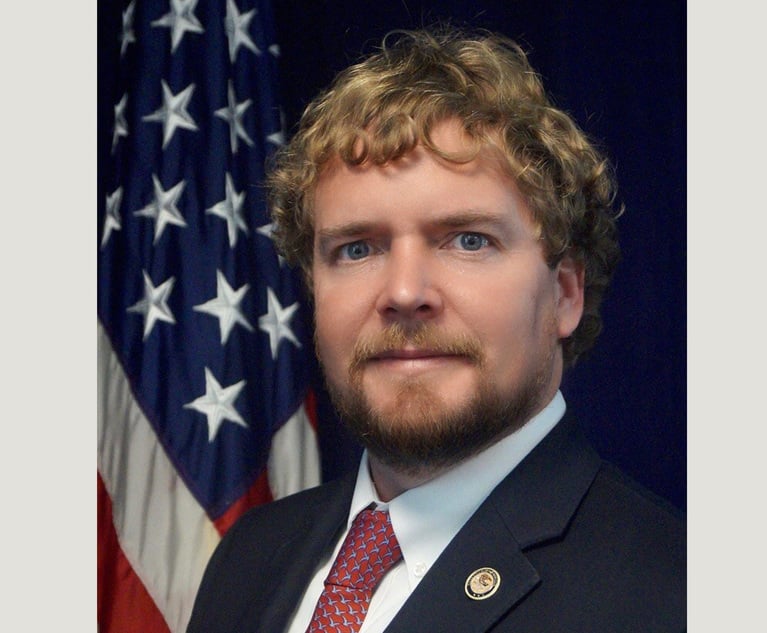Judge: Involuntary Mental Health Commitment Not Enough to Bar Gun Ownership
A federal judge has ruled that a history of involuntary commitment to a hospital for mental health reasons is not enough to bar a person from owning firearms under federal law.
December 22, 2017 at 12:56 PM
3 minute read

A federal judge has ruled that a history of involuntary commitment to a hospital for mental health reasons is not enough to bar a person from owning firearms under federal law.
U.S. District Judge Kim R. Gibson of the Western District of Pennsylvania's ruling came in plaintiff Alton Franklin's lawsuit against the federal government, in which Franklin claimed he was unconstitutionally stripped of his right to bear arms because of a less-than-24-hour hospitalization for “acute psychosis,” according to Gibson's opinion.
Gibson's ruling focused on 18 U.S.C. 922(g)(4), the federal statute that lays out the circumstances for prohibition of firearm ownership for a person deemed “a mental defective,” and its interplay with Section 302 of the Pennsylvania Mental Health Procedures Act, detailing involuntary commitment for mental health reasons.
Although Franklin was committed, Gibson held that because he was not deemed a mental defective, he was not prohibited from owning guns. However, Gibson noted that the case presented deeper legal issues that he could not explore, since they were unnecessary to resolving the case at hand.
“While this narrow disposition of this matter leaves many of the specific, novel legal issues raised and argued by the parties undecided, the court deems it inappropriate to adjudicate or opine on issues—regardless of their novelty—when the examination of such issues is not necessary to fully resolve the case before it,” Gibson said.
Franklin's lawyer, Joshua Prince, said Gibson's ruling still had a broader impact than deciding a single case.
“Judge Gibson has found that a 302 emergency mental health evaluation is not sufficient to trigger a federal firearm and ammunition disability under Section 922(g)(4), since it does not meet the requirements for a formal commitment under federal law,” Prince said in an email. “This means that other individuals in Pennsylvania, who have only underwent a 302 emergency mental health evaluation, would likewise not be prohibited under federal law. This is a monumental decision, since prior to it, an individual who was 302'ed would have little recourse, absent a Second Amendment as-applied challenge, since although there is a state-relief provision, it does not provide federal relief, as discussed by Judge Gibson in his decision.”
Prince continued, “Moreover, while not directly addressing the constitutional issues, Judge Gibson acknowledged that we raised very serious concerns over the constitutionality of stripping an individual of his/her right to keep and bear arms in perpetuity in the absence of due process. This decision now sets the foundation for challenging Pennsylvania's state prohibition on those very grounds.”
This content has been archived. It is available through our partners, LexisNexis® and Bloomberg Law.
To view this content, please continue to their sites.
Not a Lexis Subscriber?
Subscribe Now
Not a Bloomberg Law Subscriber?
Subscribe Now
NOT FOR REPRINT
© 2025 ALM Global, LLC, All Rights Reserved. Request academic re-use from www.copyright.com. All other uses, submit a request to [email protected]. For more information visit Asset & Logo Licensing.
You Might Like
View All

Superior Court Directs Western Pa. Judge to Recuse From Case Over Business Ties to Defendant
3 minute read

Trending Stories
- 1Plaintiff Argues Jury's $22M Punitive Damages Finding Undermines J&J's Talc Trial Win
- 2Bannon's Fraud Trial Delayed One Week as New, 'More Aggressive,' Defense Attorneys Get Ready
- 3'AI-Generated' Case References? This African Law Firm Is Under Investigation
- 4John Deere Annual Meeting Offers Peek Into DEI Strife That Looms for Companies Nationwide
- 5Why Associates in This Growing Legal Market Are Leaving Their Firms
Who Got The Work
J. Brugh Lower of Gibbons has entered an appearance for industrial equipment supplier Devco Corporation in a pending trademark infringement lawsuit. The suit, accusing the defendant of selling knock-off Graco products, was filed Dec. 18 in New Jersey District Court by Rivkin Radler on behalf of Graco Inc. and Graco Minnesota. The case, assigned to U.S. District Judge Zahid N. Quraishi, is 3:24-cv-11294, Graco Inc. et al v. Devco Corporation.
Who Got The Work
Rebecca Maller-Stein and Kent A. Yalowitz of Arnold & Porter Kaye Scholer have entered their appearances for Hanaco Venture Capital and its executives, Lior Prosor and David Frankel, in a pending securities lawsuit. The action, filed on Dec. 24 in New York Southern District Court by Zell, Aron & Co. on behalf of Goldeneye Advisors, accuses the defendants of negligently and fraudulently managing the plaintiff's $1 million investment. The case, assigned to U.S. District Judge Vernon S. Broderick, is 1:24-cv-09918, Goldeneye Advisors, LLC v. Hanaco Venture Capital, Ltd. et al.
Who Got The Work
Attorneys from A&O Shearman has stepped in as defense counsel for Toronto-Dominion Bank and other defendants in a pending securities class action. The suit, filed Dec. 11 in New York Southern District Court by Bleichmar Fonti & Auld, accuses the defendants of concealing the bank's 'pervasive' deficiencies in regards to its compliance with the Bank Secrecy Act and the quality of its anti-money laundering controls. The case, assigned to U.S. District Judge Arun Subramanian, is 1:24-cv-09445, Gonzalez v. The Toronto-Dominion Bank et al.
Who Got The Work
Crown Castle International, a Pennsylvania company providing shared communications infrastructure, has turned to Luke D. Wolf of Gordon Rees Scully Mansukhani to fend off a pending breach-of-contract lawsuit. The court action, filed Nov. 25 in Michigan Eastern District Court by Hooper Hathaway PC on behalf of The Town Residences LLC, accuses Crown Castle of failing to transfer approximately $30,000 in utility payments from T-Mobile in breach of a roof-top lease and assignment agreement. The case, assigned to U.S. District Judge Susan K. Declercq, is 2:24-cv-13131, The Town Residences LLC v. T-Mobile US, Inc. et al.
Who Got The Work
Wilfred P. Coronato and Daniel M. Schwartz of McCarter & English have stepped in as defense counsel to Electrolux Home Products Inc. in a pending product liability lawsuit. The court action, filed Nov. 26 in New York Eastern District Court by Poulos Lopiccolo PC and Nagel Rice LLP on behalf of David Stern, alleges that the defendant's refrigerators’ drawers and shelving repeatedly break and fall apart within months after purchase. The case, assigned to U.S. District Judge Joan M. Azrack, is 2:24-cv-08204, Stern v. Electrolux Home Products, Inc.
Featured Firms
Law Offices of Gary Martin Hays & Associates, P.C.
(470) 294-1674
Law Offices of Mark E. Salomone
(857) 444-6468
Smith & Hassler
(713) 739-1250





